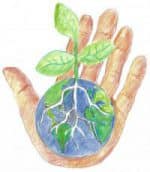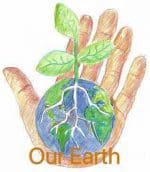Earth Trusteeship - Give Earth a Voice !
“The mutual-aid tendency in man has so remote an origin, and is so deeply interwoven with all the past evolution of the human race, that is has been maintained by mankind up to the present time, notwithstanding all vicissitudes of history.”
"The well-being of a community of people working together will be the greater, the less the individual claims for himself the proceeds of his work, i.e. the more of these proceeds he makes over to his fellow-workers, the more his own needs are satisfied, not out of his own work but out of the work done by others."
Rudolf Steiner
The fundamental social law (1906)
"The ethics of Earth stewardship are an integral part of the world’s religions and indeed humanity’s cultural heritage, but these ethics have never been more topical than today. We should be ready, therefore, for taking the step towards Earth trusteeship."
Prof Klaus Bosselmann, New Zealand
Chair Ecological Law and Government Association, ELGA
ELGA seeks to provide a forum and a platform for diverse groups to work together and amplify their voices to transform our current human-centered, growth-focused legal paradigm, to an Earth-centered, ‘ecological law and governance’ paradigm to better protect the foundations of life.
CALL UPON the United Nations

To initiate a process of consultation, negotiation and eventual adoption of a Universal Declaration on Responsibilities for Human Rights and Earth Trusteeship based on these principles.
Who owns the Earth?
We all do. Or more correctly, none of us does. All life depends on Earth’s life-supporting systems. Our legal system operates in a way as if there is no need for the sustainability and integrity of the Earth system. Laws protect and serve the well-being of people – some more than others -, but has little regard for the well-being of future generations, non-humans and the Earth as a whole.
(Introduction Text The Hague Principles, 10 December 2018)
Text of The Hague Principles for a Universal Declaration on Responsibilities for Human Rights and Earth Trusteeship
- Principle 1 : Responsibilities for Earth
1.1. All human beings, individually and collectively, share responsibility to protect Nature, of which we are an integral part, the integrity of Earth’s ecological systems and Earth as a whole, home of all living beings.
1.2. Each state individually, and the international community of states collectively, acknowledge that they have, and share, responsibilities for Nature, in cooperation and in alliance with their citizens as equal trustees of Earth and the integrity of Earth’s ecological systems.
- Principle 2 : Responsibilities within the Community of Life
2.1. Human rights are grounded in our membership within the community of life, the Earth community, which qualifies what rights we are called on to honor and what responsibilities we have for each other and for Nature.
2.2. Responsibilities for Nature, the Earth community and rights of Nature are grounded in the intrinsic values of nature and of all living beings.
- Principle 3 : Responsibilities for Human Rights
3.1. All human beings are responsible for the protection of human rights and for affirming human rights in their ways of thinking and acting.
3.2. Each state has a prime responsibility for the protection of human rights as a trustee of its citizens and all human beings.
Right Livelihood Award Foundation
Answers from Tony Clarke (Right Livelihood Award 2005), Polaris Institute, Canada Camila Montecinos, GRAIN (Right Livelihood Award 2011), Chile Lennart Olsson, LUCSUS, Right Livelihood College, Lund University
TEDTalk on the Rights of Nature
In a nutshell: “Who owns nature?” We cannot claim ownership over nature. We are nature and depend on nature. We should be humble as humans, putting nature in our society where it belongs: represented, as a holder of rights, beneficiary of, conservation, protection and restoration. Thus we should create ways through which nature is represented in society. In The Netherlands this could work via legal personhood - as we know it for companies and has been set up in New Zealand for nature. We can introduce a specific legal entity for nature: Het Natuurschap (or ‘Natureship’). Text: Jan van de Venus - JustLaw, Amsterdam



